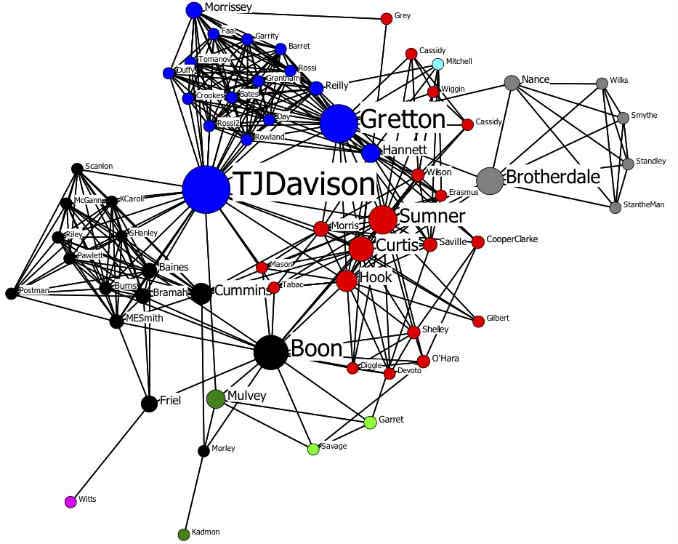Social network analysis
The focus of social network analysis is on the network of relations. A social network consists of a set of actors (also called nodes or vertices) together with a set of edges (also called arcs) that link pairs of actors. Since edges can share actors (e.g., the A.B edge shares an actor with the B.C edge) this creates a connected web that we think of as a network.
It is important to realize that actors can be individuals (such as persons in an organization, or monkeys in a troop) or collectivities (such as teams, firms, countries or species). The edges are the realization of a particular relation. Hence the actors could be people and the edges friendship, or advice giving. If the actors are firms then the edges could be trades with or collaborates with. The edges may also have values associated with them that represent the strength or frequency of the relation.
In addition, we normally assume that actors have attributes, by which we mean characteristics or features, such as age or size or personality. Network analysis typically consists of examining both actor attributes and the network of relations

Manchester experts and projects
Key additional information
- John P Scott. 2000. Social Network Analysis: A Handbook. SAGE Publications
- Wasserman, S. and K. Faust, 1994, Social Network Analysis. Cambridge: Cambridge University Press
- Ulrik Brandes, Thomas Erlebach. 2005. Network Analysis: Methodological Foundations. Springer
- International Network for Social Network Analysis
- Introduction to social network methods: A free on line text on Social Network Analysis based on the software package UCINET
- Analytic Technologies website: Software and resources on UCINET and Netdraw.
Staff interested in social network analysis
- Catherine Fullwood (Medicine), Longitudinal Analysis
- David Reeves (Medicine), Quality of Care and Patient Management/Analysis
- Dawn Edge (Nursing, Midwifery and Social Work), Health Inequalities
- Fay Bradley (Pharmacy and Pharmaceutical Sciences), Innovation In Practice
- Alan Warde (Social Sciences), Consumption and Sociology
- Elisa Bellotti (Social Sciences), Social Network Analysis
- Francesca Gains (Social Sciences), Public Policy
- Gindo Tampubolon (Social Sciences), Social Mobility, Ethnicity and Health
- Jennifer Mason (Social Sciences), Relationships and Personal Life
- Katherine Davies (Social Sciences), Kinship
- Kingsley Purdam (Social Sciences), Public Consultations
- Laura Morales (previously Social Sciences), Political behaviour and participation
- Mark Elliot (Social Sciences), Statistical Disclosure
- Martin Everett (Social Sciences), Social Network Analysis
- Nick Crossley (Social Sciences), Social Movements and Sociology
- Sarah Cotterill (Social Sciences), Civic Engagement
PDF slides
Download PDF slides of the presentation 'What is social network analysis?'
